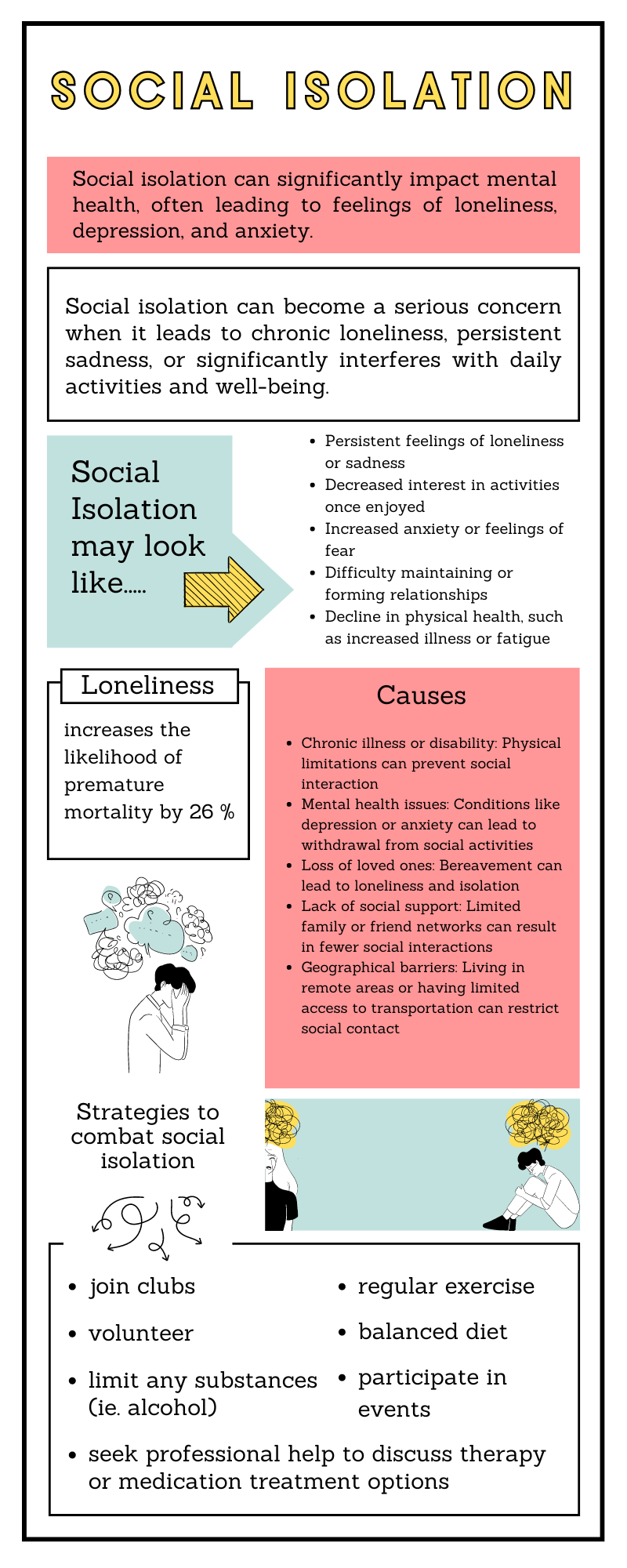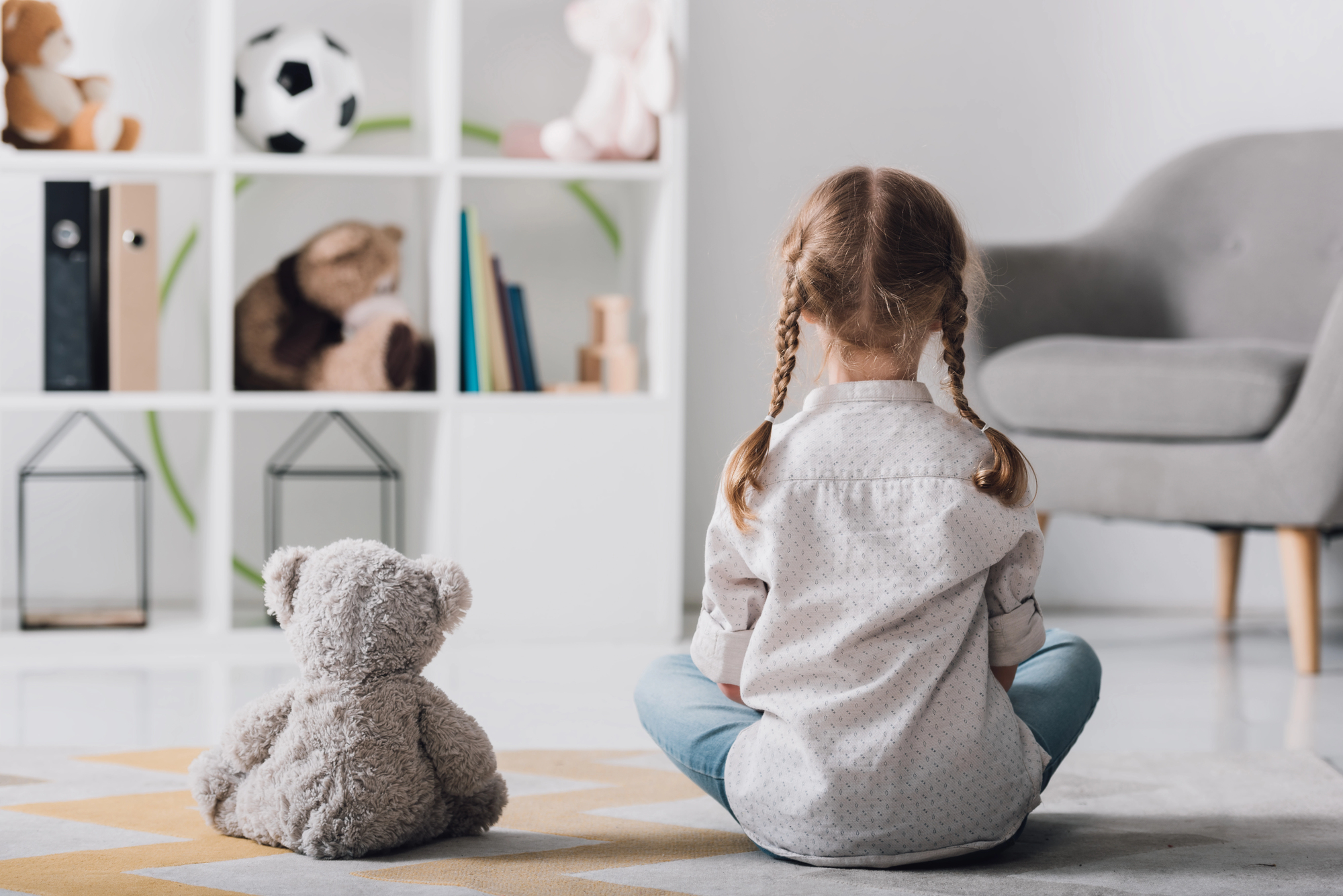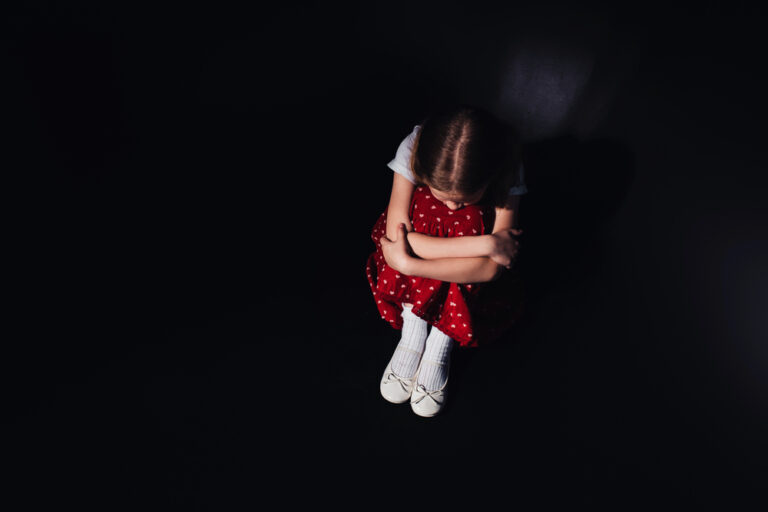Why Do I Isolate Myself From Everyone: Social Isolation Explained
Why Do I Isolate Myself From Everyone: Social Isolation Explained

We all have days when we want to be alone, but often, these feelings can become more than a passing phase. Isolation usually occurs while we are dealing with emotions like grief, depression, or anxiety. It’s not always easy to recognize when we are in isolation, but understanding why we isolate ourselves can help us take the first step toward connection and healing.
There are various reasons why we might self-isolate. For some, it’s the result of a traumatic experience or a mental health condition like social anxiety or PTSD. Others might be coping with the loss of a loved one or the overwhelming weight of stress. These feelings can make interacting with others feel daunting.
Knowing the signs of social isolation can help us better understand our own behaviors and find ways to reconnect. Building a support system and seeking help when needed can make a significant difference in overcoming isolation and improving our mental health.
What is Social Isolation?
Social isolation occurs when we limit our social interactions and connections with others. It can take various forms and significantly impact our mental health.

Definition of Social Isolation
Social isolation means having limited to no contact with others. This may happen by choice or due to circumstances beyond our control. People who are socially isolated often have little to no communication with friends, family, or acquaintances.
Unlike loneliness, which is a feeling, social isolation is a physical state in which our social network and interactions are minimal or non-existent. This can lead to a lack of emotional support and companionship, making coping with life’s challenges difficult.
Different Forms of Social Isolation
There are several ways in which we may experience social isolation. One form is physical isolation, where we are physically separated from others, possibly due to location or mobility issues.
Another form is emotional isolation, where we might be around people but feel emotionally disconnected or unsupported. We might also engage in self-isolation, actively withdrawing from social activities and people.
Each form of isolation can have unique challenges and effects on our lives. Understanding the different forms of isolation allows us to spot the signs and take steps to address them.
Impact of Social Isolation on Mental Health
Social isolation can significantly affect our mental health. It can lead to feelings of loneliness, sadness, and even depression. Studies have shown that prolonged isolation can increase the risk of mental health issues like anxiety and suicidal thoughts1.
It can also affect our sleep, making it difficult to get restful, worsening our overall mood and stress levels, or causing us to sleep too much. Additionally, we might experience decreased self-esteem and confidence when we lack social interactions and support from others.
Having a limited social network can make us feel disconnected and less motivated to engage in healthy behaviors, such as exercising and seeking medical help when needed. Recognizing these impacts can help us improve our mental well-being by proactively reconnecting.
Reasons for Social Isolation
Social isolation may occur for several reasons, including psychological, mental health, environmental, and behavioral factors. These factors play a significant role in why people might choose to isolate themselves from others.

Psychological Factors
Our thoughts and feelings significantly affect our desire to socialize. For instance, low self-esteem can make us doubt whether others like or accept us. We might constantly think we need to improve, making avoiding social situations easier.
Past traumas or negative experiences contribute, too. If we’ve been bullied or faced rejection before, we might prefer staying alone to avoid getting hurt again. This can lead to a pattern of isolation, where we feel safer by ourselves.
Another factor is the need for more communication skills. Social interactions feel challenging when we don’t know how to express ourselves well. The fear of saying something wrong might push us to avoid others. We may not feel competent or equipped enough to communicate effectively—or we may not find ourselves relatable.
Mental Health Conditions
Mental health issues are a significant cause of social isolation. Conditions like depression can make us feel sad, hopeless, and uninterested in activities such as socializing. Depression and other mental illnesses cause us to withdraw from friends and family.
Anxiety disorders are a significant reason that many avoid socializing. The fear of being judged or embarrassed can lead to avoiding social situations altogether. Similarly, people with social anxiety often feel extreme discomfort around others – and within themselves.
Schizophrenia and bipolar disorder can also cause isolation. The symptoms of these conditions, such as paranoia or mood swings, make it hard to maintain relationships. Medication can be helpful, but focusing on the foundational work is often the quickest and most effective way to make progress.
Foundational work typically refers to dealing with foundational aspects such as:
- Understanding and addressing the root causes of a problem
- Engaging in therapeutic practices (like EMDR, DBT, or other forms of psychotherapy)
- Making lifestyle changes (diet, exercise, sleep, etc.)
Environmental Factors
Our surroundings greatly influence our social interactions. Living in remote or isolated areas makes it harder to connect with others. We might have few opportunities to meet people if we are far from friends or social centers.
The family environment impacts us, too. Growing up in a household with poor communication or abusive relationships can teach us to isolate. We learn to keep to ourselves to avoid conflict or distress.
Work and school environments are crucial in our social lives. Busy schedules and demanding jobs can leave little time for socializing. If we’re constantly working or studying, we might prioritize these over building social connections, leading to isolation. It’s essential to strike a balance to meet our social needs.
Behavioral Patterns
Our habits and behaviors can contribute significantly to isolation. Spending most of our time on solitary activities, like reading or gaming, limits our interaction. While these activities are not harmful, too much focus can reduce social time.
Avoidance coping is another pattern. If we feel stressed or overwhelmed, we might choose to stay away from people to handle these feelings. Self-isolation becomes a method to avoid stressors.
Feeling pressured to conform or fit into social norms can lead to isolation. When we feel pressured to be someone we’re not, we might choose isolation to avoid this stress. We might become tired of trying to fit in and prefer staying alone.
Signs and Symptoms
When we isolate ourselves from those around us, anxiety can manifest in different emotional, behavioral, and physical ways3. If we lean in, we can better understand and recognize these signs and symptoms and take steps to address the issue.

Emotional Signs
One key emotional sign is feeling overwhelmed by social interactions. Even the thought of social events can cause anxiety or stress. We may leave social interactions feeling like we need to “charge our battery.” We may also feel a deep sense of loneliness even when around others. Mood swings are shared, where we shift from being irritable to sad without clear reasons.
Another significant emotional sign is the feeling of worthlessness or low self-esteem. We may start to believe that others don’t want us around or that we are a burden, leading us to interpret the most minor neutral interactions as rejection. This can create a cycle where these feelings lead us to withdraw, and isolation strengthens these feelings.
Additionally, a lack of interest in activities we once enjoyed can be a telling sign. If we no longer find joy in our hobbies or spending time with loved ones, this might be an emotional symptom of isolation.
Behavioral Signs
Behavioral signs often include a reduction in social activities. We might avoid gatherings, meetings, or even low-key hangouts with friends. This withdrawal can start as flakiness and become more frequent over time until we disengage almost wholly.
We might also notice changes in communication patterns. Expected behaviors include responding less to messages, avoiding phone calls, and finding excuses not to meet up. We might also become more secretive or mysterious about our daily activities.
Neglecting responsibilities can be another sign. This includes skipping work, not attending classes, or avoiding chores at home. Our routines can become disrupted, affecting our overall quality of life and well-being.
Physical Signs
Isolation doesn’t only affect our minds; it can also have a significant impact on our bodies. Changes in sleep patterns are common2. We might find it hard to fall asleep or stay asleep, leading to insomnia, or we might sleep too much as a way of avoiding reality.
Isolation can also lead to changes in our eating habits, resulting in a loss of appetite or, conversely, an increase in eating as a coping mechanism. These changes can lead to noticeable weight changes, either gaining or losing weight rapidly – both can contribute to self-esteem issues and may further social isolation out of fear of being “seen.”
Another physical sign is a constant feeling of fatigue. This isn’t just tired from lack of sleep but a profound, lingering exhaustion that doesn’t go away with rest—which can often be heightened by feeling taxed by social interactions.
Our immune system might also weaken, making us more susceptible to illnesses.
Identifying these signs enables us to begin addressing the underlying issues and working towards reconnecting with those around us.
Impact on Mental Health
Isolating ourselves can have several adverse effects on our mental well-being. We can experience increased levels of depression and anxiety, lower self-esteem, and even suicidal thoughts3.

Increased Risk of Depression and Anxiety
When we isolate ourselves, it’s common to feel more depressed. Social interaction helps us stay connected and feel supported. Without it, we might start feeling lonely and sad – considering we are wired for connection.
We also might notice increased anxiety. Being away from people we care about can make us feel stressed and worried. This can create a cycle where our anxiety leads to more isolation, which makes us feel even worse.
Effects on Self-Esteem and Self-Worth
When we’re isolated, our self-esteem suffers. Social connections help build our confidence and sense of self-worth. As much as we hate to admit it, we rely on external validation (some more than others) to some degree. When we don’t have external validation, it’s easy to start doubting ourselves.
We may think we’re not good enough or something is wrong. This negative self-talk can spiral, making it hard to break the cycle.
Relationship Between Social Isolation and Suicidal Ideation
Isolation can also be linked to suicidal thoughts. We might feel like there’s no way out of our problems without anyone to talk to. The lack of interaction can make us feel like we’re in a tunnel with no light at the end.
It’s vital to seek help if we’re feeling this way. Talking to a mental health professional or calling a crisis hotline can provide the support needed to navigate these complicated feelings.
Crisis hotline(s):
- National Suicide Prevention Lifeline: 1-800-273-8255 (1-800-273-TALK)
- Crisis Text Line: Text HOME to 741741
- SAMHSA’s National Helpline: 1-800-662-HELP (4357)
- Veterans Crisis Line: 1-800-273-8255 and press 1, or text 838255
- TrevorLifeline (LGBTQ+ Youth): 1-866-488-7386
30 Quotes About Social Isolation
Many of us encounter social isolation at some point. Here is a collection of quotes that relate to this experience:

- “Solitude is fine but you need someone to tell that solitude is fine.” – Honoré de Balzac
- “We don’t function well as human beings when we’re in isolation.” – Robert Zemeckis
- “Loneliness and the feeling of being unwanted is the most terrible poverty.” – Mother Teresa
- “We are all so much together, but we are all dying of loneliness.” – Albert Schweitzer
- “The eternal quest of the human being is to shatter his loneliness.” – Norman Cousins

- “It is strange to be known so universally and yet to be so lonely.” – Albert Einstein
- “Isolation is a self-defeating dream.” – Carlos Salinas de Gortari
- “Loneliness is about the scariest thing there is.” – Joss Whedon
- “Loneliness is my least favorite thing about life. The thing that I’m most worried about is just being alone without anybody to care for or someone who will care for me.” – Anne Hathaway
- “Social isolation is one of the most devastating things you can do to a human being.” – Rosalind Wiseman

- “The worst loneliness is to not be comfortable with yourself.” – Mark Twain
- “Loneliness is the ultimate poverty.” – Pauline Phillips
- “I feel lonely every single day of my life but I’m ashamed to admit that to the people who love me.” – Anonymous
- “Being lonely is like having a charger but no phone—you’re missing the connection.” – Life analogy
- “When the snows fall and the white winds blow, the lone wolf dies but the pack survives.” – George R.R. Martin

- “I wish I could break free from this prison of my own making.” – Unknown
- “Let me tell you this: if you meet a loner, no matter what they tell you, it’s not because they enjoy solitude. It’s because they have tried to blend into the world before, and people continue to disappoint them.” – Jodi Picoult
- “Loneliness is like quicksand. The harder you try to get out of it, the deeper you fall into its turmoil.” – Unknown
- “A great fire burns within me, but no one stops to warm themselves at it, and passers-by only see a wisp of smoke.” – Vincent Van Gogh
- “None of us can be truly human in isolation.” – Harold S. Kushner

- “Loneliness is the poverty of self; solitude is the richness of self.” – May Sarton
- “The greatest disease in the West today is not TB or leprosy; it is being unwanted, unloved, and uncared for. We can cure physical diseases with medicine, but the only cure for loneliness, despair, and hopelessness is love.” – Mother Teresa
- “I keep people at a distance because I’m afraid they’ll leave, but it’s lonely here.” – Anonymous
- “I long for connection, but fear of rejection keeps me isolated.” – Anonymous
- “No one can live entirely on their own, nor can any country or society exist in isolation.” – Daisaku Ikeda

- “Isolation and loneliness are central causes of depression and despair.” – Bell Hooks
- “I wish I had the courage to break down the walls I’ve built around myself.” – Unknown
- “The danger of isolation is much greater than the risk of intimacy.” – Steven Furtick
- “It’s hard to admit, but sometimes I isolate myself to protect my heart from getting hurt.” – Unknown
- “Don’t give up on me when I isolate myself.” – Jen Jolly
How to Overcome Social Isolation?

To tackle social isolation, we can seek the guidance of mental health professionals, create a supportive network, join social activities, and practice self-care and self-compassion.
Seeking Professional Help
Talking to a mental health professional can be incredibly beneficial when we feel isolated. Therapists can help us understand the root cause(s) of our isolation and provide personalized strategies to reconnect with others. They can also help us manage other mental health conditions that might contribute to our isolation, such as anxiety or depression.
Additionally, speaking to doctors about our feelings can rule out any medical conditions affecting our psyche.
Building a Support Network
Creating a solid support network is essential for overcoming isolation. Reaching out to family members, friends, or colleagues can help us feel more connected and less isolated.
We can start by reaching out to schedule regular catch-ups with our peers or join online communities to meet people with similar interests. Support groups, especially for those dealing with specific issues like grief or addiction, can be a safe space for sharing and bonding with others who understand our struggles.
Engaging in Social Activities
Participating in social activities is another effective way to break free from isolation. Joining clubs, sports teams, or community groups can provide us with regular opportunities to interact with others.
We can also volunteer for causes we care about, which gives us a sense of purpose and opportunities to meet like-minded people. Local events and gatherings can be found easily through social media or community bulletin boards.
Stepping out slowly, starting with small gatherings and gradually increasing social interactions, helps us ease into more active social lives without feeling overwhelmed.
Practicing Self-Care and Self-Compassion
Looking after our mental and physical well-being is critical to combating isolation. Prioritizing self-care routines, such as exercising, eating well, and getting enough sleep, can boost our mood and energy levels, making us more open to socializing.
It’s important to be kind to ourselves and recognize that it’s okay to need breaks or feel hesitant sometimes. Practicing mindfulness or journaling can help us process feelings and reinforce a positive self-image.
By caring for ourselves and being patient with the process, we create a strong foundation supporting our efforts to re-engage with the world around us.
Wrap-Up

We’ve explored why we might isolate ourselves and the impact of this behavior. It’s important to remember that recognizing the problem is the first step toward overcoming it.
Recap of Key Points
Self-isolation can stem from various causes, such as depression, social anxiety, or past trauma. Some common signs include avoiding social outings, ignoring calls or texts, and skipping activities we usually enjoy. Recognizing these signs helps us better understand our behavior and identify when to seek help.
We also learned about the adverse effects of self-imposed isolation. It can worsen feelings of loneliness and contribute to mental health issues. We can take proactive steps to reconnect and heal by understanding these key points.
Encouragement for Seeking Help and Overcoming Social Isolation
It takes courage to seek help, but it is a crucial step in overcoming social isolation. By considering talking to a therapist who can help us address the root causes of our behavior, we empower ourselves. For instance, if we struggle with depression, discussing it with a therapist can provide valuable insights and strategies, putting us in control of our journey.
Additionally, engaging in small social activities can make a big difference. Starting with low-pressure environments like joining a club or attending community events can help us gradually rebuild our social connections.
We should also lean on friends and family whenever possible. Letting them know what we’re experiencing can help them better support us, providing a sense of comfort and care. Remember, we’re not alone in this voyage.

Frequently Asked Questions
Is there a reason why some people prefer solitude over social interaction?
Yes, some people simply enjoy spending time alone. They might find great comfort and relaxation in solitude. It’s also possible that they feel overwhelmed by social situations and prefer to avoid them.
Can self-isolation be a symptom of an underlying psychological condition?
Self-isolation can be linked to various mental health conditions like PTSD, OCD, depression or anxiety. For instance, depression can make someone feel hopeless and down, causing them to withdraw from others. At the same time, conditions such as OCD may provoke an immense amount of anxiety, which makes social interaction feel threatening to some.
What are effective strategies to reconnect with others after a period of isolation?
To reconnect, start with small steps like reaching out to a trusted friend. Engaging in group activities or hobbies can also be helpful. Therapy or counseling can provide additional support and strategies tailored to your needs.
How does isolation impact mental health and well-being?
Isolation can have negative effects on our mental health. It may lead to feelings of loneliness, sadness, or even worsen existing mental health conditions. Being alone for long periods can also impact our physical health.
Is it common for people with anxiety to withdraw from social situations?
Yes, some people with anxiety often withdraw from social interactions. They might avoid social settings to escape feelings of nervousness or fear. This can lead to self-isolation as a way to cope with their anxiety.
Why do I isolate myself from everyone?
Many people isolate themselves due to various factors, such as feeling overwhelmed by social interactions, anger and/or resentment, experiencing anxiety or depression, or having a fear of judgment. Lean in and get curious. The first step is asking yourself, “Why do I isolate myself from everyone?” Once you identify the motivation behind your social isolation, you can then take proactive steps to address the root cause, such as EMDR therapy, medication, mental health workshops and groups, and mindfulness – which are all effective treatments for anxiety and depression.
What are the common signs that indicate I am isolating myself from everyone?
Common signs of social isolation include avoiding social activities, withdrawing from friends and family, feeling lonely despite being around others, and a general lack of interest in social interactions.
What should I do if I notice someone isolating themselves from everyone?
If you notice someone isolating themselves, try to reach out with empathy and understanding, offer your support, encourage them to engage in social activities, and suggest seeking professional help.
About The Author
Taylor O’Horo, Marketing Specialist, Biofeedback Technician, BA in Psychology.

Hi! I am Taylor O’Horo, marketing specialist, biofeedback technician, and administrative assistant. I am a mom to three kiddos – a first responder wife and Veteran spouse. I recently earned my bachelor’s in psychology from Arizona State University and plan to earn my master’s in counseling. Everyone has a story, and I am no different. Overcoming the adversities, I’ve experienced has helped me to learn more about resilience and how to be there for others. I believe all humans can heal!
References:
1 American Psychological Association. (n.d.). Apa PsycNet. American Psychological Association. https://psycnet.apa.org/record/2017-48932-001
2 Azizi-Zeinalhajlou, A., Mirghafourvand, M., Nadrian, H. et al. The contribution of social isolation and loneliness to sleep disturbances among older adults: a systematic review. Sleep Biol. Rhythms 20, 153–163 (2022). https://doi.org/10.1007/s41105-022-00380-x
3 Holt-Lunstad J;Smith TB;Baker M;Harris T;Stephenson D; (n.d.). Loneliness and social isolation as risk factors for mortality: A Meta-Analytic Review. Perspectives on psychological science : a journal of the Association for Psychological Science. https://pubmed.ncbi.nlm.nih.gov/25910392/








